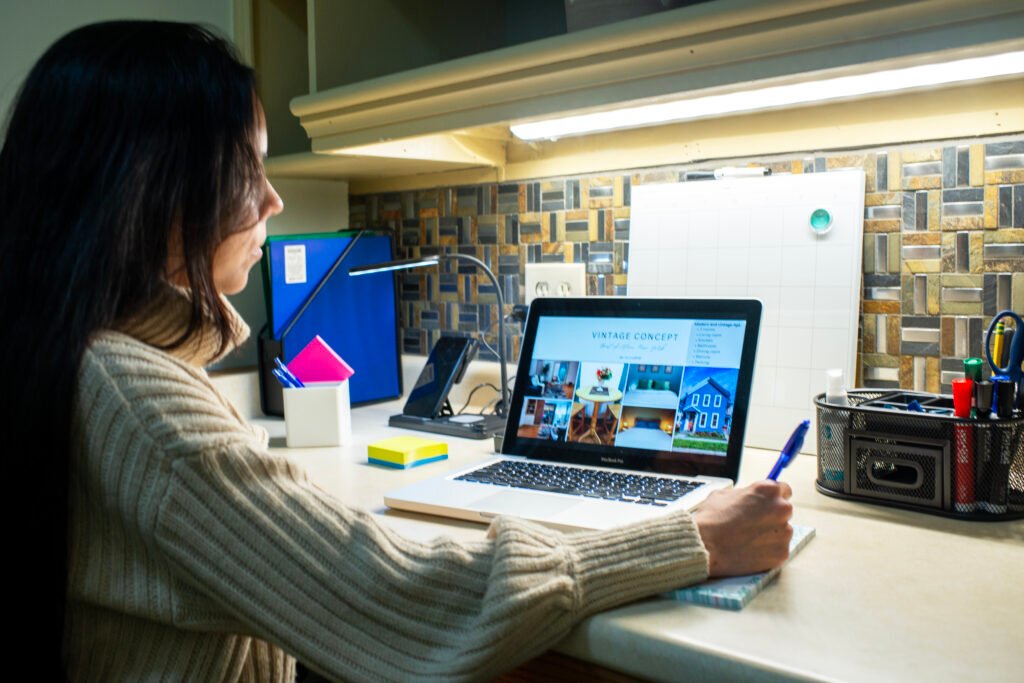In a world where over 6 million vacation rentals compete for travelers’ attention, standing out as a short-term rental host has become a daunting challenge. However, a recent study reveals that just a 1% increase in occupancy can translate to a staggering $1,000 in additional revenue per property. This statistic underscores the immense potential for savvy short-term rental owners to differentiate their offerings and capture a larger share of this lucrative market.
This comprehensive guide will equip you with the strategies and insights needed to elevate your short-term rental, attract more bookings, and outshine the competition. From understanding the market landscape to crafting a compelling unique selling proposition, you’ll discover practical steps to make your property stand out in the Airbnb marketing strategies and vacation rental optimization.
Key Takeaways
- Understand the current trends and key competitors in the short-term rental market
- Define your target audience and cater to their specific preferences
- Develop a unique selling proposition to differentiate your property
- Enhance your property’s appeal through strategic interior design and amenities
- Optimize your online presence and leverage social media to reach more guests
Understanding the Short-Term Rental Landscape
As the vacation rental optimization landscape continues to evolve, it’s crucial for short-term rental operators to stay informed on the current market trends and key competitors in their local area. This understanding can help shape effective strategies to stand out in the saturated short-term rental market.
Current Market Trends
The short-term rental industry has experienced significant growth in recent years, driven by the rise of alternative accommodation platforms like Airbnb and VRBO. This has led to an influx of new properties entering the market, creating a highly competitive environment. Additionally, global events such as the COVID-19 pandemic have had a significant impact, reshaping guest preferences and travel patterns.
Key Competitors
Identifying and analyzing your key competitors is crucial for vacation rental optimization. Take the time to research other short-term rental properties in your area, comparing their amenities, pricing, guest reviews, and unique selling points. This information can help you identify opportunities to differentiate your offering and better cater to the needs of your target audience.
| Competitor | Unique Selling Points | Amenities | Pricing Range |
|---|---|---|---|
| Airbnb Loft | Stylish urban design, city center location | Full kitchen, hot tub, roof terrace | $150 – $300 per night |
| Beachside Bungalow | Direct beach access, family-friendly | Private pool, outdoor living space, kid’s playroom | $200 – $400 per night |
| Cozy Cottage | Rustic charm, pet-friendly | Fireplace, fenced yard, dog-walking trail | $100 – $250 per night |
By understanding the current market trends and analyzing your key competitors, you can develop a more informed and targeted vacation rental optimization strategy to stand out in the competitive short-term rental market.
Defining Your Target Audience
To stand out in the saturated short-term rental market, understanding your target audience is crucial. By identifying the demographics and preferences of your ideal guests, you can tailor your property and services to meet their unique needs, ultimately enhancing their overall experience and setting your rental apart from the competition.
Demographics of Guests
When defining your target audience, consider factors such as age, income, travel purpose, and geographic location. This information will help you create a more detailed guest profile and make informed decisions about your property’s amenities, marketing strategies, and pricing.
- Age: Cater to young families, couples, or solo travelers by offering amenities and experiences tailored to their specific needs.
- Income: Understand the purchasing power of your target guests and adjust your pricing and offerings accordingly.
- Travel purpose: Whether it’s a romantic getaway, a family vacation, or a business trip, align your property and services to meet the needs of your guests’ travel purpose.
- Geographic location: Consider the areas from which your guests are most likely to come and adapt your marketing strategies to reach them effectively.
Guest Preferences
Delving deeper into your target audience’s preferences can help you create a truly exceptional guest experience. Analyze factors such as their desired amenities, location, and experiences to differentiate your property and stand out in the market.
- Amenities: Identify the must-have and nice-to-have features that your guests value, such as high-speed Wi-Fi, fully equipped kitchens, or dedicated workspace areas.
- Location: Understand the ideal location for your target guests, whether it’s proximity to popular attractions, public transportation, or quiet, secluded areas.
- Experiences: Offer unique and memorable experiences that align with your guests’ interests, such as local culinary tours, outdoor adventures, or cultural immersion activities.
By understanding the demographics and preferences of your target audience, you can craft a compelling guest experience enhancement that sets your short-term rental apart and attracts the right guests to your property.
| Guest Preference | Importance | Potential Offerings |
|---|---|---|
| Amenities | High | High-speed Wi-Fi, fully equipped kitchen, smart home features |
| Location | High | Proximity to attractions, public transportation, or serene settings |
| Experiences | Medium | Local culinary tours, outdoor activities, cultural immersion |
Crafting a Unique Selling Proposition
In a saturated short-term rental market, standing out from the competition is crucial. One effective way to do this is by developing a compelling unique selling proposition (USP) that highlights what makes your property truly distinctive. By identifying and communicating the unique features, services, or experiences that your rental offers, you can attract the attention of your target audience and differentiate yourself from the crowd.
Identifying What Makes You Different
Take a close look at your property and the amenities you provide. What sets your rental apart from others in the area? Perhaps it’s your stunning ocean views, a private hot tub, or an extensive collection of board games for family entertainment. Consider the unique selling points that your competitors may not be able to match, and focus on showcasing these distinctive qualities.
Benefits of a USP
- Attracts your target guests by addressing their specific needs and desires
- Helps you stand out in a crowded market and differentiate your property
- Provides a compelling reason for potential guests to choose your rental over others
- Allows you to command a premium price and increase your overall profitability
By crafting a well-defined USP that resonates with your target audience, you can elevate your property’s appeal and improve your chances of securing more bookings in the competitive short-term rental landscape.

“A strong unique selling proposition is the foundation for a successful short-term rental business. It’s what sets you apart and makes your property a must-book destination for your ideal guests.”
Enhancing Property Appeal
In the competitive world of short-term rentals, creating a visually appealing and functional property is crucial to attracting potential guests. By focusing on interior design, outdoor amenities, and professional photography, you can elevate your property’s unique amenities and stand out in the crowded market.
Interior Design Tips
When it comes to interior design, your goal should be to create a welcoming and comfortable atmosphere that caters to the needs of short-term rental guests. Consider incorporating the following design elements:
- Opt for a neutral color palette with pops of accent colors to make the space feel fresh and inviting.
- Invest in high-quality, durable furniture that can withstand frequent use by guests.
- Incorporate smart storage solutions to keep the space organized and clutter-free.
- Enhance the ambiance with strategic lighting, including task lighting and mood lighting.
- Add personal touches, such as artwork or decorative accessories, to create a unique and memorable experience.
Outdoor Amenities
Outdoor spaces can be a significant draw for short-term rental guests, offering a chance to relax and unwind. Consider enhancing your outdoor areas with the following unique amenities:
- A well-maintained patio or deck with comfortable seating and dining options.
- A private garden or landscaped area with native plants and a tranquil atmosphere.
- Outdoor recreation features, such as a hot tub, firepit, or outdoor games.
- Shaded areas, such as a pergola or gazebo, to provide respite from the sun.
- Outdoor lighting to extend the usability of the space during the evening hours.
Professional Photography
Capturing your property’s best features through professional photography is essential for showcasing its unique amenities online. Invest in high-quality images that highlight the interior design, outdoor spaces, and overall ambiance of your short-term rental. These visuals will help potential guests visualize their stay and make an informed decision about booking your property.
| Feature | Benefit |
|---|---|
| Neutral Color Palette | Creates a welcoming and versatile environment |
| Durable Furniture | Withstands frequent guest use |
| Outdoor Recreation | Provides additional amenities for guests to enjoy |
| Professional Photography | Showcases the property’s unique features to potential guests |

“Attention to detail is key when creating a visually appealing and functional short-term rental property. Invest in the right design elements and amenities to elevate your guests’ experience.”
Optimizing Your Online Presence
In the highly competitive short-term rental market, having a strong online presence is crucial to attracting potential guests. Crafting a user-friendly website that effectively showcases your property and simplifies the booking process can make all the difference. Additionally, implementing SEO best practices can significantly boost your visibility in search engine results, allowing you to reach a wider audience and drive more bookings.
Importance of a User-Friendly Website
Your website serves as the digital face of your vacation rental, and it must be designed with the user experience in mind. Ensure that your website is visually appealing, easy to navigate, and provides clear information about your property, amenities, and availability. Streamline the booking process by incorporating a user-friendly reservation system that allows guests to quickly and seamlessly secure their stay.
Best Practices for SEO
- Optimize your Airbnb marketing strategies and vacation rental optimization efforts to enhance your online visibility.
- Conduct keyword research to identify the terms and phrases your target audience is searching for, and incorporate them naturally into your website content and metadata.
- Improve your site’s loading speed and mobile-friendliness, as these factors are critical for SEO and user experience.
- Leverage social media platforms to drive traffic to your website and build your online brand.
- Regularly monitor your website’s performance and analytics to identify areas for improvement and make data-driven decisions.
By focusing on creating a user-friendly website and implementing effective SEO strategies, you can boost your Airbnb marketing strategies and vacation rental optimization, ultimately driving more bookings and growing your short-term rental business.
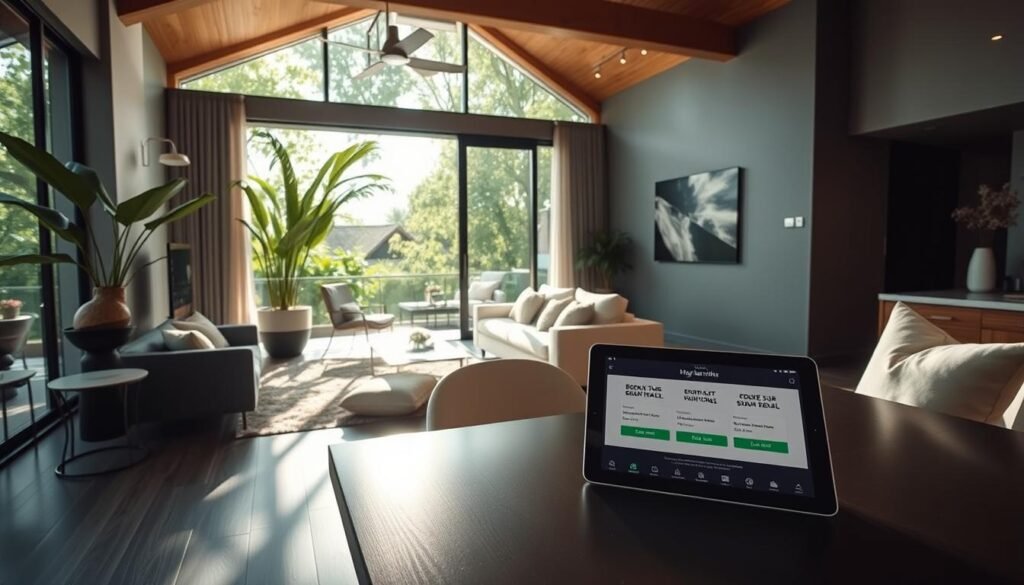
Leveraging Social Media
In today’s digital landscape, social media has become a powerful tool for vacation home owners to attract and engage with potential guests. By strategically leveraging platforms that resonate with your target audience, you can effectively showcase your property’s unique offerings and build a strong online presence that sets you apart in the competitive short-term rental market.
Identifying the Right Social Media Platforms
The key is to focus on the social media platforms where your target guests are most active. Platforms like Instagram, Facebook, and Pinterest are often popular among travelers seeking visually appealing vacation experiences. Meanwhile, professional networks like LinkedIn can be valuable for connecting with corporate clients or business travelers.
Creating Engaging Content
- Showcase your vacation home’s stunning interiors, cozy ambiance, and unique amenities through a mix of high-quality images and videos.
- Highlight the local attractions, events, and experiences that guests can enjoy during their stay, fostering a sense of excitement and anticipation.
- Share behind-the-scenes glimpses of property maintenance, cleaning, and guest interactions to build trust and transparency.
- Engage with your followers by responding to comments, running contests or giveaways, and encouraging user-generated content.
By consistently publishing captivating, informative, and interactive content, you can cultivate a loyal following, increase brand awareness, and ultimately drive more bookings for your vacation home.
“Effective social media promotion can be the difference between a fully booked calendar and vacant dates for vacation home owners.”
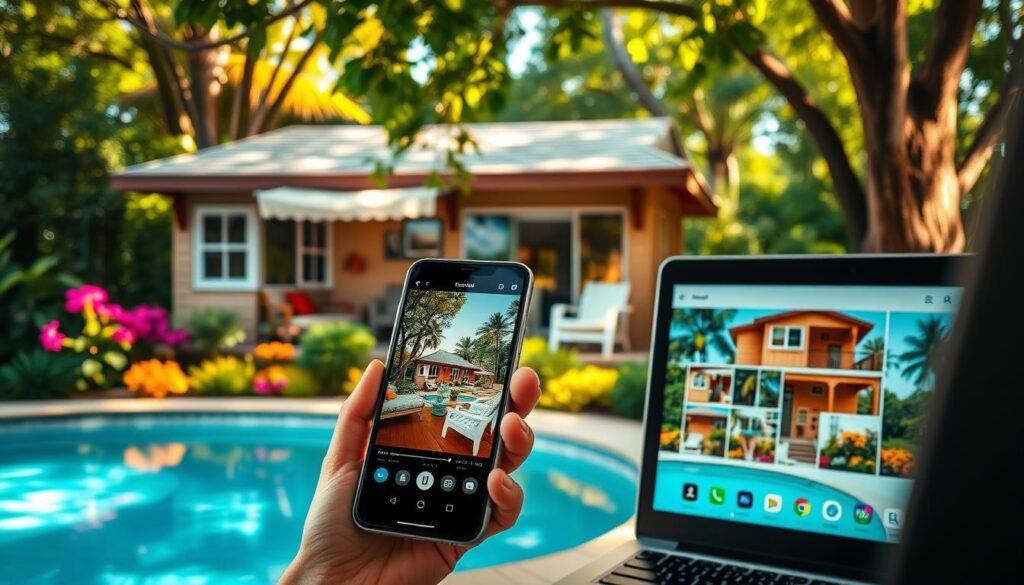
Implementing Effective Pricing Strategies
In the highly competitive short-term rental market, crafting the right pricing strategy is crucial for standing out and maximizing your revenue. To achieve this, conducting a thorough competitive pricing analysis is a must. By closely examining the rates and offerings of your local competitors, you can position your property effectively in the market and avoid under or overpricing.
Competitive Pricing Analysis
Start by researching the pricing of similar properties in your area. Consider factors like size, amenities, location, and review ratings when comparing. This will give you a clear understanding of the going rates for your target market. Analyze how your competitors adjust their prices based on seasonality, local events, and demand fluctuations. Leverage this data to ensure your pricing remains competitive and appealing to potential guests.
Dynamic Pricing Tools
- Utilize dynamic pricing tools to automatically adjust your rates in response to market conditions. These advanced algorithms can help you optimize your pricing for peak seasons and high-demand periods, ensuring you capture the maximum revenue.
- Look for tools that integrate with your existing vacation rental platforms, seamlessly updating your prices across multiple channels.
- Closely monitor your property’s performance and occupancy rates to fine-tune your pricing strategies, ensuring you stay ahead of the competition.
By combining competitive analysis and dynamic pricing tools, you can create a well-rounded pricing strategy that sets your short-term rental apart and drives impressive returns, especially during peak seasons.
“Effective pricing is the key to unlocking the full potential of your short-term rental property.”
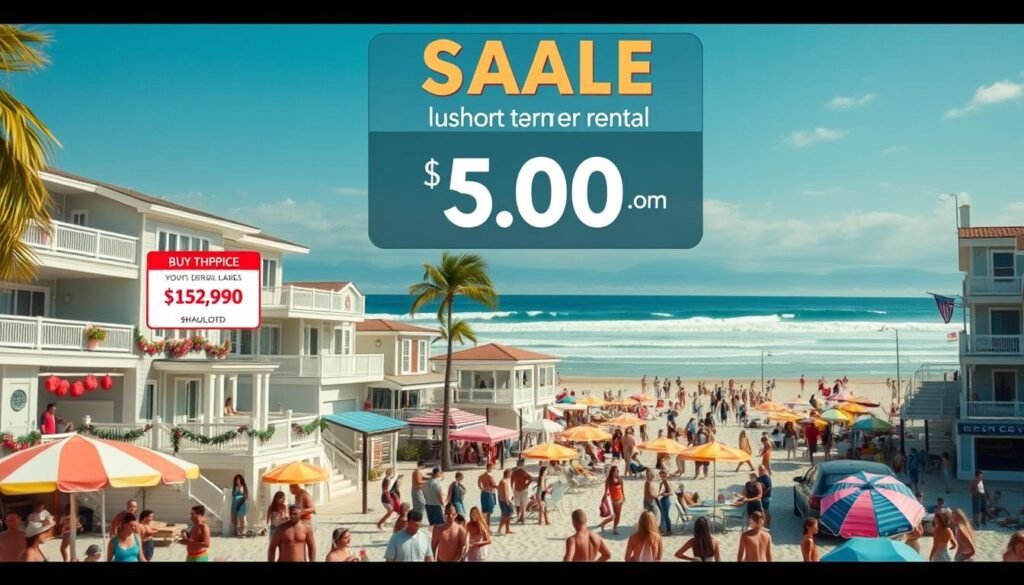
Providing Exceptional Customer Service
In the competitive short-term rental market, delivering exceptional customer service can be the key to guest experience enhancement and long-term success. As an Airbnb host, proactive communication and efficient handling of guest feedback are essential to maintaining high satisfaction levels and building a positive reputation.
Importance of Communication
Effective communication with your guests is paramount. Ensure you have a clear, responsive process in place to address any questions or concerns they may have before, during, and after their stay. Respond promptly to inquiries, provide detailed instructions, and offer personalized assistance to make your guests feel valued and supported.
Handling Guest Feedback
Guest feedback, both positive and negative, is a valuable asset that can help you continually improve your guest experience enhancement efforts. Encourage guests to share their experiences by actively soliciting reviews. When faced with negative feedback, approach it with an open mind and a commitment to resolving any issues. Respond professionally, take responsibility, and offer solutions to demonstrate your dedication to customer satisfaction.
“The key to success in the short-term rental market is to consistently provide an exceptional guest experience. By prioritizing communication and addressing feedback, you can build a loyal customer base and set yourself apart from the competition.”
By prioritizing guest experience enhancement through effective communication and proactive feedback management, you can create a reputation for outstanding customer service, ultimately driving more bookings and positive reviews for your Airbnb property.
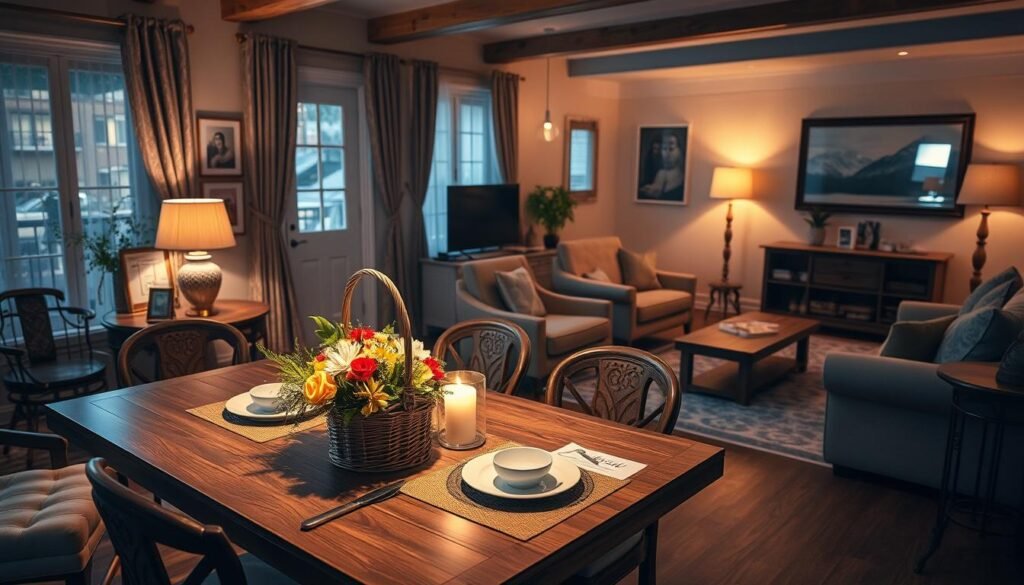
Building Positive Guest Reviews
In the competitive world of short-term rentals, leveraging online reviews can be a powerful tool to attract new guests and build trust with potential customers. By implementing a systematic approach to soliciting feedback and responding to guest reviews, hosts can cultivate a positive reputation that sets their property apart from the competition.
Soliciting Reviews
Encourage guests to leave reviews by making the process simple and timely. Provide clear instructions on how to leave a review, either through the booking platform or by directly emailing guests after their stay. Consider offering a small incentive, such as a discount on a future booking, to motivate guests to share their experiences.
Responding to Feedback
Respond professionally to all guest reviews, whether positive or negative. Acknowledge any concerns raised and outline the steps taken to address them, demonstrating a commitment to customer satisfaction. Highlight the positive aspects of the stay to reinforce the property’s strengths and build trust with potential guests who may be leveraging online reviews to make their booking decisions.
| Review Response Tips | Positive Reviews | Negative Reviews |
|---|---|---|
| Respond Promptly | Express Gratitude | Acknowledge Concerns |
| Be Professional | Highlight Property Features | Outline Corrective Actions |
| Address Concerns | Invite Future Bookings | Apologize Sincerely |
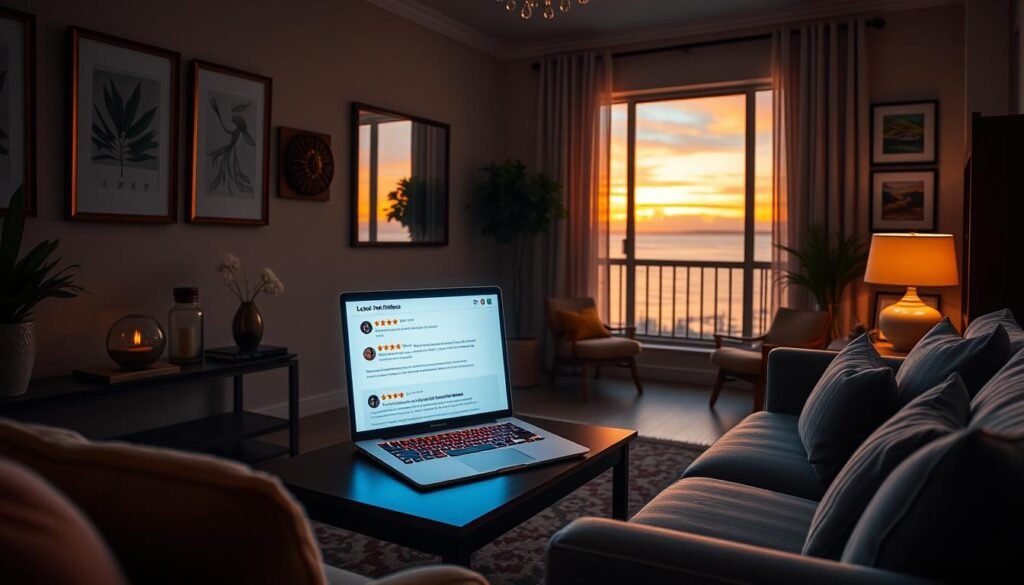
By consistently leveraging online reviews to improve the guest experience, hosts can build a positive reputation that attracts more bookings and repeat business. This proactive approach to review management can be a key differentiator in a crowded short-term rental market.
Establishing Partnerships
In the dynamic world of short-term rentals, standing out from the competition requires strategic partnerships. By collaborating with local businesses, you can create unique experiences and offer exclusive discounts that cater to your guests’ preferences. Additionally, joining rental networks and associations can expand your reach, allowing you to tap into a broader customer base and gain valuable industry insights.
Collaborating with Local Businesses
Forge partnerships with local restaurants, activity providers, and other relevant businesses to offer your guests a more immersive and memorable stay. These partnerships can include:
- Exclusive discounts or packages for your guests at local establishments
- Curated itineraries featuring recommended local experiences
- Co-marketing efforts to promote each other’s services and attract new customers
By leveraging these local partnerships, you can differentiate your rental property and provide a more well-rounded experience for your guests, ultimately enhancing their satisfaction and the likelihood of positive reviews and repeat bookings.
Joining Rental Networks
Connecting with rental associations and networks can be a game-changer for local partnerships for rental hosts. These organizations often offer a wealth of resources, including industry insights, educational opportunities, and access to a broader network of fellow short-term rental hosts. By joining these networks, you can:
- Stay informed about market trends and best practices
- Collaborate with other hosts to share knowledge and insights
- Gain visibility and potential referrals through the network’s platforms
Investing time and effort into building these valuable partnerships can pay dividends in the long run, helping you stand out in the crowded short-term rental market and deliver a more exceptional experience for your guests.
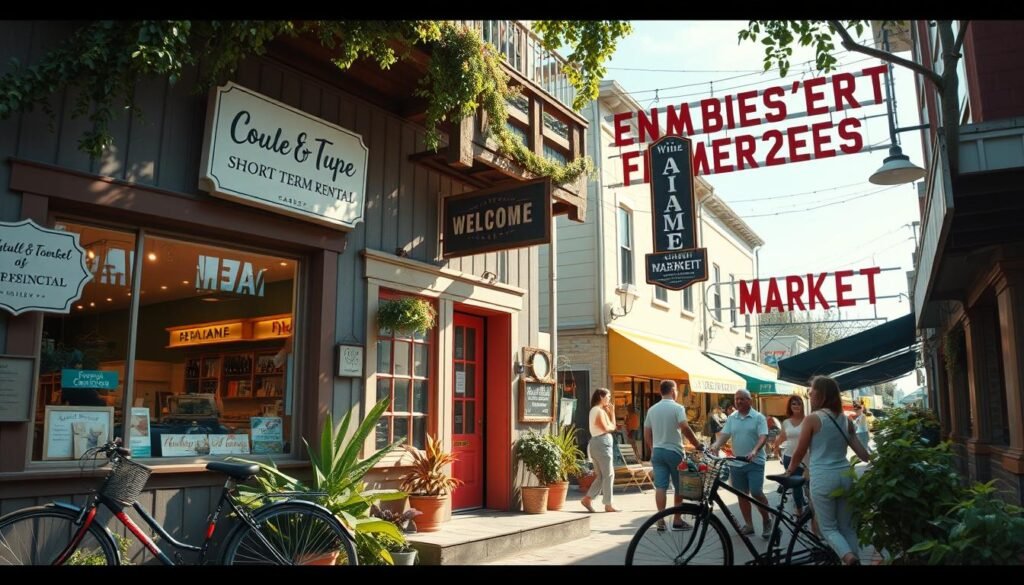
Understanding Local Regulations
As the short-term rental market continues to grow, it’s crucial for property owners to stay informed about the local regulations governing this industry. Compliance with zoning laws, licensing requirements, and tax obligations can make or break a successful vacation rental business.
Compliance with Laws
Before listing your property on short-term rental platforms, familiarize yourself with the local laws and regulations in your area. These can vary significantly by location, and non-compliance can result in hefty fines or even the shuttering of your rental operation. Be sure to research zoning restrictions, noise ordinances, and any specific rules or permits required for short-term rentals in your municipality.
Managing Taxes and Licenses
In addition to legal compliance, short-term rental owners must also navigate the complex world of taxes and licensing. Depending on your location, you may be required to collect and remit occupancy taxes, sales taxes, or other levies on rental income. Obtaining the necessary business licenses and permits is also essential to operate legally and avoid potential penalties.
To stay on top of local regulations, it’s advisable to consult with local authorities, professional associations, or experienced short-term rental managers in your area. By proactively addressing compliance and tax obligations, you can ensure your short-term rental business maintains a reputable and sustainable presence in the competitive short-term rental market.
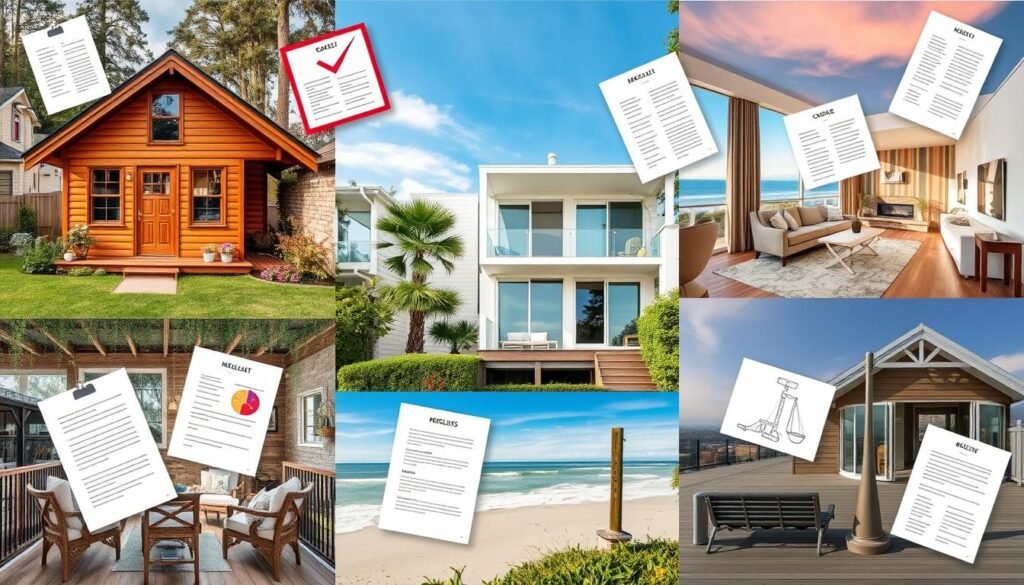
| Regulation Type | Key Considerations |
|---|---|
| Zoning Laws | Ensure your property is zoned for short-term rental use, and adhere to any restrictions on the number of guests or days per rental. |
| Licensing and Permits | Obtain all necessary business licenses, vacation rental permits, and other required documentation to operate legally. |
| Taxes | Familiarize yourself with applicable occupancy taxes, sales taxes, and income taxes related to short-term rental income. |
| Noise Ordinances | Understand and comply with local noise regulations to avoid disrupting neighboring properties. |
“Staying on top of local regulations is critical for short-term rental owners who want to build a successful and sustainable business. Non-compliance can lead to costly fines and legal issues, so it’s important to do your research and maintain a strong understanding of the rules in your area.”
Marketing Your Rental Property
In the saturated short-term rental market, effective marketing strategies are crucial to stand out and attract the right guests. When it comes to promoting your Airbnb property, a well-rounded approach that combines online and offline tactics can significantly boost your visibility and bookings.
Online Advertising Options
Leveraging digital platforms is a powerful way to reach a wider audience. Paid search engine advertising, such as Google Ads, can help you target potential guests searching for vacation rentals in your area. Additionally, social media ads on platforms like Facebook and Instagram allow you to showcase your property’s unique features and connect with your target demographics.
Offline Marketing Strategies
While online marketing is essential, don’t overlook the impact of offline tactics. Networking at local events, such as community gatherings or industry conferences, can help you build relationships with other short-term rental hosts and potential guests. Investing in print advertising in local publications can also increase your visibility within the community and reach those who may not be as active online.
Integrating a mix of Airbnb marketing strategies, both digital and traditional, can maximize your property’s exposure and drive more bookings. By focusing on a diverse set of marketing channels, you can effectively reach and engage with your target audience, ultimately setting your rental apart in the competitive short-term rental landscape.

“Successful marketing is not about luck, it’s about strategy. Identify your target audience, craft a compelling message, and leverage the right channels to reach them effectively.” – Marketing Expert, Jane Doe
Creating Unique Guest Experiences
In the saturated short-term rental market, standing out from the competition requires offering guests a truly unique and memorable experience. One effective way to achieve this is by highlighting the local culture and attractions of your property’s location. By curating exclusive experiences that showcase the community’s distinctive charm and activities, you can elevate your short-term rental and provide an enhanced guest experience enhancement.
Offering Local Experiences
Partner with local businesses, artisans, and tour operators to create bespoke packages and activities for your guests. This could include guided walking tours, cooking classes featuring regional cuisine, wine tastings at nearby vineyards, or even exclusive access to unique local events or festivals. By immersing your guests in the authentic flavor of the destination, you can foster a deeper connection and leave a lasting impression.
Themed Stays and Packages
Develop themed stays and packages that cater to specific interests or occasions, setting your property apart from standard accommodations. For example, you could offer a “Romantic Retreat” package with a private chef-prepared dinner, couples’ massage, and rose petal turndown service. Or, create a “Family Fun” package with in-room games, a scavenger hunt, and a private movie screening. By providing these unique amenities for short-term rentals, you can attract a wider range of guests and enhance their overall experience.
| Unique Experience | Included Amenities |
|---|---|
| Romantic Retreat |
|
| Family Fun |
|
By crafting these unique experiences, you can captivate your guests and set your property apart in the competitive short-term rental landscape.

Keeping Up with Technology
In the dynamic world of vacation rental optimization, staying ahead of technological advancements is paramount. By integrating smart home features and leveraging advanced booking management software, vacation rental property owners can elevate the guest experience and streamline their operations.
Smart Home Features
The adoption of smart home technologies can transform a vacation rental into a truly modern and convenient experience for guests. Features such as voice-controlled assistants, automated lighting, and temperature control systems can enhance guest comfort and ease of use. These smart home features not only provide a delightful touch but also contribute to improved energy efficiency, ultimately benefiting both the guest and the property owner.
Booking Management Software
Investing in robust booking management software is a crucial step in optimizing vacation rental operations. These advanced platforms offer a wide range of features, including real-time availability updates, automated pricing adjustments, and seamless integration with various online booking platforms. By leveraging these tools, vacation rental property owners can streamline the booking process, improve occupancy rates, and provide a seamless experience for guests.

“Embracing technology is not just about modernizing the guest experience; it’s about enhancing operational efficiency and staying competitive in the ever-evolving vacation rental market.”
As the vacation rental industry continues to evolve, property owners who stay ahead of technological trends will be better positioned to attract and retain guests, ultimately driving their vacation rental optimization efforts.
Utilizing Data Analytics
In the highly competitive short-term rental market, harnessing the power of data analytics can be a game-changer for vacation rental owners and managers. By implementing robust data tracking and analysis, you can gain valuable insights to enhance your property’s performance and better cater to your guests’ preferences.
Tracking Rental Performance
Utilize data analytics tools to closely monitor key performance indicators (KPIs) for your vacation rental. Track metrics such as occupancy rates, average daily rates, revenue per available night, and guest reviews. By analyzing these data points, you can identify trends, optimize pricing strategies, and make informed decisions to drive higher bookings and revenue.
Understanding Guest Behavior
Delving into guest behavior patterns can help you create a more personalized and satisfying experience for your visitors. Analyze data on guest demographics, length of stay, booking lead times, and activities booked. This valuable information can guide you in enhancing your property’s amenities, crafting targeted marketing campaigns, and anticipating the needs of your target audience.
By optimizing your vacation rental through data-driven, you can stay ahead of the competition and consistently provide exceptional experiences for your guests, ultimately driving increased bookings and revenue.

“Data is the new oil. It’s valuable, but if unrefined it cannot really be used.”
– Clive Humby, Mathematician and Architect of Tesco’s Clubcard
Sustainability in Short-Term Rentals
As sustainability becomes an increasingly important consideration for travelers, short-term rental hosts have the opportunity to appeal to eco-conscious guests by implementing unique amenities for short-term rentals that promote environmental responsibility. By adopting eco-friendly practices and highlighting sustainable features, you can differentiate your property and attract a growing segment of the market that prioritizes responsible travel.
Eco-Friendly Practices
Incorporating sustainable elements into your short-term rental can enhance its appeal and contribute to a more environmentally conscious guest experience. Consider implementing the following eco-friendly practices:
- Energy-efficient lighting, such as LED bulbs, to reduce electricity consumption
- Invest in renewable energy sources, such as solar panels, to power your property
- Provide recycling bins and encourage guests to reduce waste during their stay
- Use water-efficient appliances and fixtures to conserve water resources
- Implement sustainable cleaning products and practices to minimize the use of harsh chemicals
Marketing Sustainable Features
Once you have incorporated unique amenities for short-term rentals that promote sustainability, it’s essential to effectively communicate these features to potential guests. Highlight your eco-friendly initiatives in your property listings, on your website, and through your social media channels. This will help attract environmentally conscious travelers and demonstrate your commitment to responsible tourism.
By embracing sustainability in your short-term rental operations, you can differentiate your property, appeal to a growing segment of the market, and contribute to a more sustainable future for the industry.
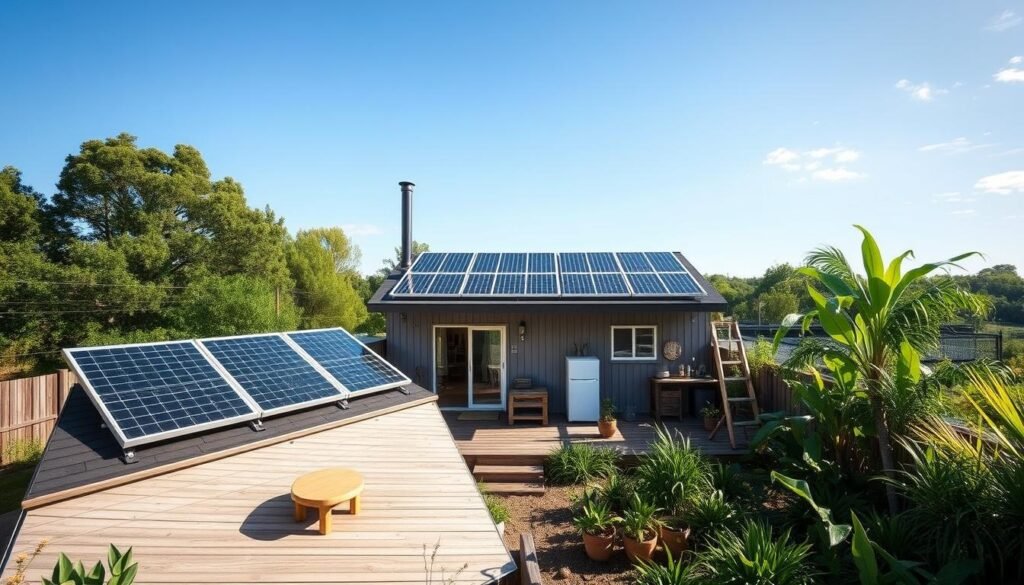
Continually Improving Your Offering
In the ever-evolving short-term rental landscape, it is crucial to maintain a proactive approach to enhancing your property and adapting to guest feedback. Regularly updating your rental to align with industry trends and guest preferences can help you stay ahead of the competition and provide an exceptional experience for your visitors.
Regular Property Updates
Implementing a consistent schedule for property improvements and upgrades is key to maintaining a competitive edge. Stay informed about the latest design trends, amenities, and technological advancements that can elevate your short-term rental. Whether it’s refreshing the decor, adding new outdoor features, or integrating smart home technologies, continually investing in your property’s appeal can attract discerning guests and keep them coming back.
Adapting to Guest Feedback
Closely monitoring and promptly addressing guest feedback is essential for continually improving your short-term rental offering. Carefully analyze reviews, both positive and negative, to identify areas for enhancement. Implement guest suggestions, address concerns, and incorporate their preferences to ensure your property remains aligned with evolving expectations. By adapting your rental based on guest input, you can build a loyal customer base and solidify your reputation as a premier short-term rental provider in the How to Stand Out in a Saturated Short-Term Rental Market.
FAQ
What are the current market trends in the short-term rental industry?
The short-term rental industry has seen significant growth, with the rise of alternative accommodations and the impact of global events. It’s important to analyze current market trends, including the competitive landscape, to inform your rental strategy.
How can I define my target audience for my short-term rental property?
Researching and identifying your ideal guest demographics, such as age, income, and travel purpose, can help you understand their preferences for amenities, location, and experiences. This will allow you to tailor your offering effectively.
What makes a unique selling proposition (USP) important for a short-term rental property?
Developing a compelling USP that sets your property apart from competitors can be a crucial factor in attracting bookings. Highlighting distinctive features, services, or experiences that appeal to your target audience can communicate the benefits of your rental effectively.
How can I optimize my short-term rental’s online presence to attract more guests?
Creating a user-friendly website that showcases your property and facilitating easy booking, as well as implementing SEO best practices, can improve your visibility in search engine results and attract more potential guests.
What are the best practices for leveraging social media to promote my short-term rental?
Identifying the most effective social media platforms for your target audience and developing a content strategy that showcases your property, local attractions, and guest experiences can help build engagement and attract bookings.
How can I implement effective pricing strategies for my short-term rental?
Conducting a thorough competitive pricing analysis and utilizing dynamic pricing tools to optimize rates based on demand, seasonality, and local events can help you maximize revenue throughout the year.
What are the key considerations for providing exceptional customer service in the short-term rental industry?
Developing a proactive communication strategy, efficiently handling guest feedback, and addressing concerns can help maintain high satisfaction levels and build trust with potential future guests.
How can I build positive guest reviews for my short-term rental property?
Encouraging guests to leave reviews by making the process easy and timely, and responding professionally to all feedback, can help build trust and attract more bookings.
What are the benefits of establishing partnerships for my short-term rental business?
Forming strategic partnerships with local businesses and joining rental networks can help you offer unique experiences, expand your reach, and gain valuable industry insights.
What are the key regulatory considerations for operating a short-term rental property?
Staying informed about local short-term rental regulations, including zoning laws and licensing requirements, as well as managing tax obligations, is crucial to maintain compliance and a reputable business.
How can I utilize data analytics to improve my short-term rental performance?
Implementing data analytics tools to track key performance indicators and analyze guest behavior patterns can help inform decision-making on pricing, amenities, and marketing strategies.
What are some sustainable practices I can implement in my short-term rental property?
Adopting eco-friendly practices and highlighting sustainable features in your marketing can appeal to environmentally conscious guests and contribute to responsible travel.
How can I continually improve my short-term rental offering to stay competitive?
Implementing a schedule for regular property updates and improvements, while continuously adapting your offering to meet evolving guest expectations, can help you maintain a competitive edge in the market.


